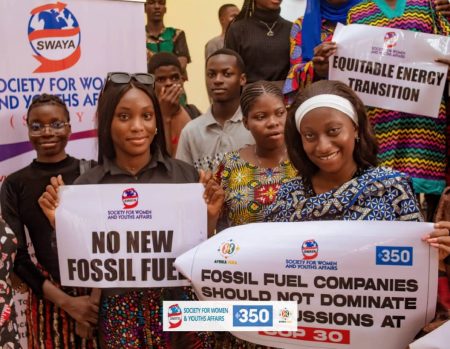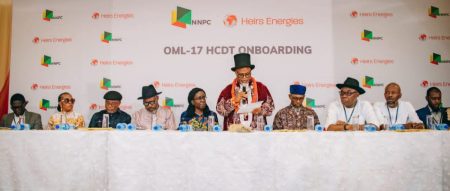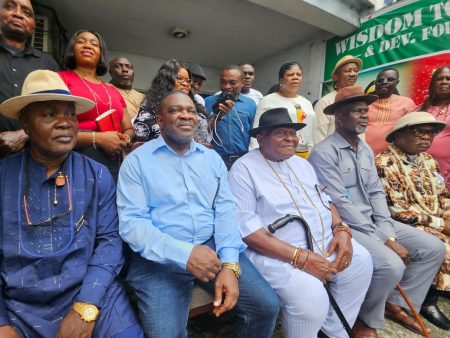
– Stakeholders seek MPAs for biodiversity, marine ecosystem preservation
Mkpoikana Udoma
Port Harcourt — With about 90 percent of sea-based pollution, including plastic wastes, in the Gulf of Guinea traceable to the Niger Delta, the Health of Mother Earth Foundation, HOMEF has charged the federal government and ECOWAS, to declare an environmental emergency in the region.
Executive Director of HOMEF, Dr. Nnimmo Bassey, said environmentalism was not about monthly evacuation of wastes from drainages, but requires that those who depend on the environment for their basic needs, reject attempts for mindless exploitation of their territories by powerful individuals and corporations.
Bassey, speaking at HOMEF’s School of Ecology on Marine Protected Areas, MPAs, held in Port Harcourt, said urgent steps must be taken to established a community-managed marine protected areas, MPAs which he said would restore degraded areas, rebuild biodiversity and liberate nature
“We have a situation where access to healthy water bodies is becoming more and more difficult by the day due to industrial installations and related pollution. In recent times, we have been witnesses to massive oil spills from blowouts at well heads at Santa Barbara river and at Ororo-1 well; explosion of FSPOs; and the incredibly polluting blow up of oil laden vessel and burning of bush refineries by the security forces.
“With about 90 percent of sea-based pollution, including plastic wastes, in the Gulf of Guinea traceable to the Niger Delta, it is time for our governments (and ECOWAS) to declare an environmental emergency in the region. We need this in order to ensure that our peoples have a safe environment to carry out their economic, socio-cultural, recreational and spiritual activities.
“One immediate step that must be taken to ensure that our aquatic commons are not enclosed and grabbed is to have community-managed Marine Protected Areas. Such protected areas could cover rivers, creeks, swamps, and continental shelf. The advantages are numerous and deeply connected to the peoples’ history and socio-cultural outlook. Such people-managed MPAs would see restoration of degraded areas, rebuild biodiversity, revive cultural practices, restore dignity and reinvigorate local economies.”
The renowned environmentalist further said the concept of Blue or Green Economy are terms that must be taken with a dose of salt, explaining that some activities within the ambit of blue economy would lead to ocean acidification and compound climate change impacts besides outright pollution.
According to him, after the extreme exploitation of the land, the sea and the sky were the new targets, which means that millions of Africans who depend on fisheries for food and nutritional security were clearly at risk.
“Some people see the promotion of the blue economy as a means of securing life under water as highlighted in the SDGs. However, there isn’t much life under water besides those coated by layers of crude oil and contaminated to outlandish levels above safe limits. What life is under water in Bayelsa State for example where the recently released report by the Bayelsa State Oil and Environment Commission reveals that “the concentration of noxious chemicals, such as total petroleum hydrocarbons, exceed safe levels by a factor of million according to some of the samples taken.”
“Blue Economy is conceptualised as the extraction of economic value from aquatic ecosystems through deep seabed mining, modern biotechnology, geoengineering, industrial fishing and a variety of other activities. Some of these activities lead to ocean acidification and compound climate change impacts besides outright pollution,” Bassey said.
Also speaking, the Executive Director of the Foundation for Environmental Sustainability and Ownership, Salome Elolo, noted the failures of MPAs in Africa to include, poor enforcement and regulations, lack of community involvement as well as unrecognized conservation.
“MPAs are critical for the conservation and management of marine ecosystems in Africa.
Successful examples of MPAs management, such as the coral reef conservation project in Tanzania and in Mozambique, still have significant challenges.
“Communication that focus on the benefits to nature of MPAs is important. It’s important now that we change the narrative to protecting nature for people. Addressing these challenges will be essential for the effective management and conservation of MPAs in Africa.”
Similarly, the National Coordinator of GEF Small Grants Programme in Nigeria, Ibironke Olubamise, said global efforts to conserve natural resources cannot be achieved without active participation of the grassroot.
She said, “Grassroot conservation is vital in preserving biodiversity and sustainable resource management. Grassroot empowerment for conservation approach must be holistic to enhance ownership that will enable communities to become effective guardians of natural resources.”
Also, an environmentalist and prominent Nigerian academic and author, Prof Sofiri Peterside, in his presentation explained that environmental degradation can be averted through the use of customs, traditions and taboos.
“The environment has been positively affected by the customs and traditions and the customs and traditions specifically affect the environment by creating norms which treat certain aspects of the environment differently from others and in the process helplng the process of safeguarding or protecting the environment.”
Follow us on twitter



